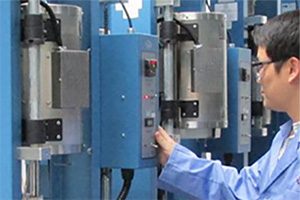CREEP AND STRESS RUPTURE TESTING VERIFIES MATERIAL PROPERTIES IN THERMAL ENVIRONMENTS
Creep and Stress rupture tests evaluate the ability of a part or material to safely hold a load, usually at in elevated temperature and sometimes humidity-specific environments.
Creep Testing measures the deformation of the material and the time it takes to rupture, Stress Rupture measures only the time it takes to rupture. These measurements are critical to manufacturers in a wide range of industries including aerospace and power generation, among others.
Creep and Stress Rupture Testing Capabilities
- Creep samples are tested at temperatures up to 1500ºF
- Stress rupture samples to 2100ºF
- Controlled relative humidity from 40% to 70%.
- Frames load capacity up to 12,000 lbs.
- Specimens single-point machined
- Low-stress grind available
- Full digital temperature and strain data logging
- Fast, accurate, measurable results
For more information on IMR's creep and stress rupture capabilities, email us, or click on the button below to request information, or a quote.


Creep Testing and Stress Rupture Testing- Benefits
Determine Material Working Conditions
Educated Material Choice Selection
Changes and Improvements to Material per Results of Testing
Failure and Financial Loss Prevention
Determine Expected Deformation
Bend Testing
Bond Strength Testing
Charpy Impact Testing (-320°F to 450°F)
Climbing Drum Adhesion of Sandwich Composites
Coating Adhesion
Coating Shear Fatigue
Coefficient of Thermal Expansion by TMA
Composite Testing (Fiber Reinforced)
Compression Set
Compressive Properties
Core Shear Properties of Sandwich Construction by Beam Flexure
Creep and Stress Rupture Testing
DMA (Dynamic Mechanical Analyzer)
Ductility
Elastic Modulus
Fatigue Testing
Filled Hole Tension & Compression
Flattening
Flat-wise Tensile Testing
Flexural Properties
Floating Roller Peel Strength
Fracture Mechanics
Gel Time
Hardness (Rockwell, Brinell, Durometer, Shore, Barcol, Knoop, Vickers, Macro Vickers)
Heat Aging
Heat Deflection by TMA
Heat Treatment (furnace to 2100°F)
Hydrogen Embrittlement
Hydrostatic Pressure
Indentation Toughness
Interlaminar Shear
Jominy Hardenability
Lap Shear Testing
Machining & Specimen Preparation
Materialography
Modulus of Rupture (MOR)
n-Value (Strain Hardening Exponent)
Open Hole Tension and Compression
Pipeline Integrity Testing
r-Value (Plastic Strain Ratio)
Residual Strength of Composites After Impact
Rotating Beam Fatigue
Shear Testing of Rivets to ASTM B565, Single/Double
Short Beam Strength
Shot Peen Qualification
Single-Edged Notched beams (SENB)
Slow Strain Rate (G129)
Specimen Conditioning
Strain Gaging
Surface Roughness (ANSI/ASME B46.1)
T Peel Strength
Tear Resistance of Films & Sheeting
Tear - Rubbers & Elastomers
Tensile Testing
Torsional and Axial Fatigue (200 lb)
Tube Testing (Tensile, Flare, Hydrostatic)
Welder & Procedure Qualification
Wire/Spring Testing (Wrap, Coil, Bend)
Young's, Tangent and Chord Modulus (Room Temperature)
RELEVANT ACCREDITATIONS
Click here for a complete list of accreditations and certifications for all IMR Test Labs locations.


